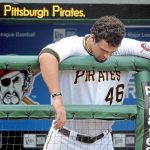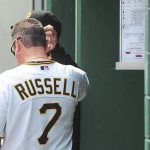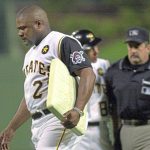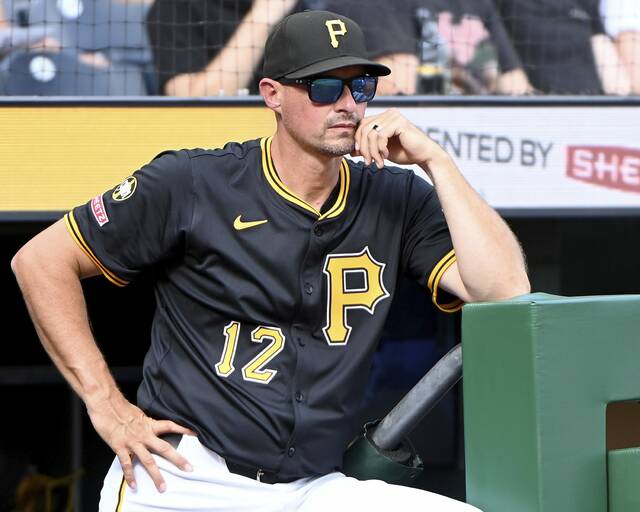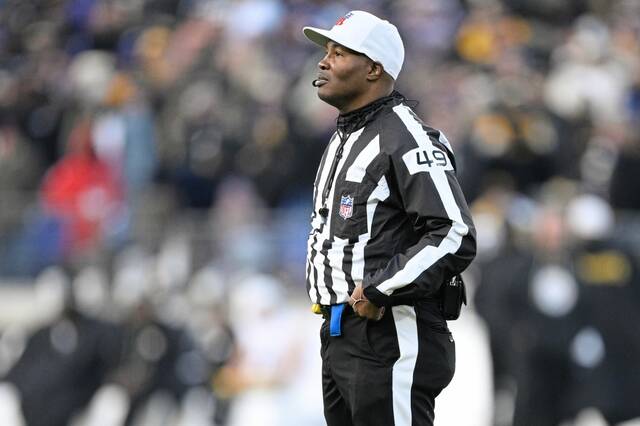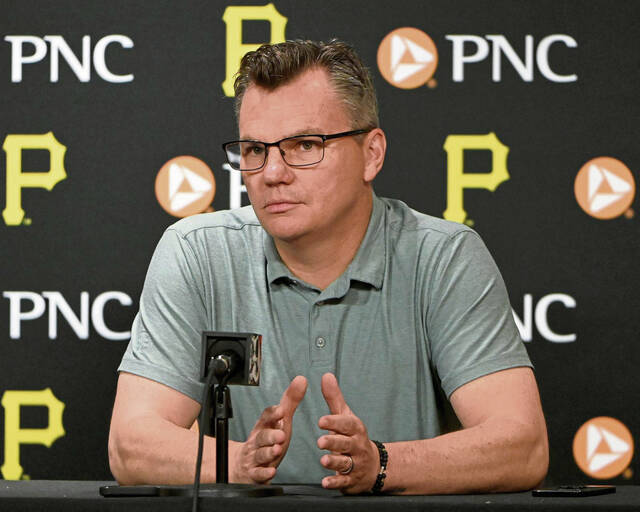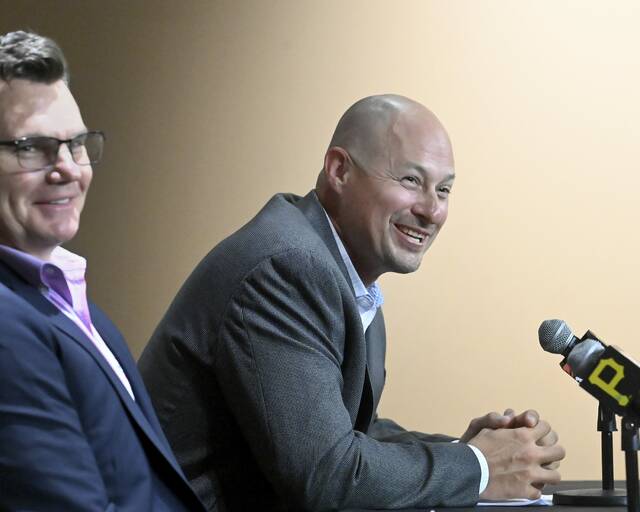The night before the Pittsburgh Pirates clinched the ninth 100-loss season in franchise history, Neil Walker sat in the AT&T SportsNet broadcast booth at PNC Park and sensed the impending doom.
Walker certainly could relate, given he was a rookie second baseman on their previous 100-loss team, when the Pirates finished 57-105 and 34 games out of first place in 2010.
Hours before serving as color analyst for the telecast of Wednesday’s Pirates-Chicago Cubs game, Walker reflected on a season he’d rather not remember and the struggles players endure on the way to triple-digit defeats.
“Your mindset is, ‘How are we going to lose this one tonight?’ ” Walker said. “It sounds harsh and kind of ugly, but it’s sometimes the nature of it as you’re creeping toward 100. I think other teams can smell blood in the water and, more oftentimes than not, things tend to go right for teams that are winning than teams that are losing.”
The Pirates reached their 100th defeat Thursday night in a 9-0 loss to the Cubs, joining the Arizona Diamondbacks (50-108), Baltimore Orioles (52-107) and Texas Rangers (59-100) to become the fourth major-league team to lose 100 games this season.
“Whether it’s 100 or 99, that doesn’t really change how I feel about the season. Losing more stinks more, so we’ve gone away from the ballpark unhappy more times than I would like,” Pirates catcher Jacob Stallings said Tuesday as they closed in on the mark. “In terms of reaching 100 losses or whatever it would be, I don’t really think about that number. I just kind of think about what can we do better, what can we do to win tonight, to be more successful next year. That’s where my focus is.”
Pirates manager Derek Shelton was in no mood to dwell on the dubious distinction after their 16th shutout loss of a season in which they were projected to win 59.5 games. He talked about moving forward and using it as motivation for next year to get better.
“You have to look at the culmination of the season,” Shelton said. “I think we go into every game wanting to win it and not put a specific number or thinking about a specific number.”
Shelton can take some solace that this isn’t the worst season in club history — the Pittsburgh Alleghenys own that record, going 23-113 in 1890 — or even by modern-day definitions. In all but one case, the historic losing was followed by playoff runs within a decade.
The 1917 Pirates, featuring Hall of Famers in a 43-year-old Honus Wagner and Max Carey, finished 51-103. The Pirates won the World Series in 1925. The Pirates endured three consecutive 100-loss seasons in the 1950s — going 42-112 in ’52, 50-104 in ’53 and 53-101 in ’54 — before beating the New York Yankees in the 1960 World Series.
The 1985 Pirates finished 57-104 in the final season for Chuck Tanner as manager and the Galbreath family as team owners. They won three consecutive NL East Division titles from 1990-92.
The 2001 Pirates opened PNC Park with 62-100 record, losing their 100th to the Cubs, 13-2, on Oct. 6 in the next-to-last game of the season. Despite the benefits of the ballpark, the Pirates never won more than 75 games between 2001-09, then crashed with the 105-loss season in ’10. The Pirates, however, earned three NL wild-card berths from 2013-15.
What Jason Kendall remembers most about the 100-loss season in 2001 was the beginning and ending and a thumb injury he played through that required surgery.
Kendall hugged Willie Stargell after catching the last ceremonial first pitch from the captain of the 1979 World Series champions in their final game at Three Rivers Stadium on Oct. 1, 2000.
“I woke up the morning of the first game at PNC Park, and Pops had passed away,” Kendall said of Stargell, who died of a stroke hours before the home opener April 9. “I had got to be very close with Willie. And you had 9/11. It was just a weird year. It was just a difficult, difficult year — and I’m just talking about those two things in general.”
The Pirates drew more than 2.4 million fans that season, though many were there to see the spectacular city view from inside the ballpark than the ballclub. One of the highlights of the season, so to speak, came June 26 when first-year manager Lloyd McClendon took first base back to the dugout in protest of an umpire’s call that ruled Kendall out.
On the downside, the Pirates traded pitcher Jason Schmidt to the San Francisco Giants and watched as he finished 7-1 with a 3.39 ERA and developed into a three-time All-Star and Cy Young finalist. It was the beginning of a trend, as the Pirates routinely traded their top players for prospects at the deadline amid a streak of 20 consecutive losing seasons.
“You look back on it, and it’s one of those things where you still have to go out and play the game,” Kendall said. “Nobody wants to lose, and nobody wants to lose 100 games. That said, you just battle. … It’s not fun but, hopefully, there’s a light at the end of it when you lose 100. It’s definitely not something when you go into spring training thinking it’s going to happen.”
Kendall emphasized that how the Pirates react to the losing will determine their future. If they continue to play hard and devote themselves to their offseason training, it could be a positive sign. If they focused on their personal statistics and go through the motions, it’s indicative that their future in the game might be best elsewhere.
“Anybody could sit there and go, ‘Boo hoo, we lost 100 and we’re probably going to do it again next year,’ ” Kendall said. “As soon as this thing is over with, you start working your tail off until February, when everybody reports. If they learned something from it, you take the positives out of it and leave the negatives behind.”
Walker sees similarities between that team and these Pirates, especially in the building of a young core. Where Walker, Andrew McCutchen and Pedro Alvarez were former first-round picks, the Pirates now have an All-Star in center fielder Bryan Reynolds and potential Gold Glove winners in catcher Jacob Stallings and third baseman Ke’Bryan Hayes.
Both teams endured double-digit losing streaks. The 2010 team lost 12 consecutive, and these Pirates dropped 10 in a row. Both teams had an early loss in which they allowed 20 runs. The 2010 team fell to the Milwaukee Brewers, 20-0, on April 22, and these Pirates lost at the Atlanta Braves, 20-1, on May 21.
“I don’t know if I remember seeing or feeling it, but you kind of understood, especially as far as roster construction was concerned, that there were going to be tons of opportunities for guys,” Walker said. “When you look around and there’s not a ton of guys that are established big-league players, you know that it could be an uphill climb.
“How they approach the game when you’re down really speaks volumes. I remember having conversations with Andrew McCutchen along the same lines. We got to the end of 2010 and were like, ‘Oh my gosh, this has been the longest season ever.’ We were like, ‘We have to do everything we can as leaders of this team to rally the troops when we get the opportunity.’ ”
Walker watched his Pirates teams add invaluable pieces like pitchers A.J. Burnett and Gerrit Cole, outfield prospects Starling Marte and Gregory Polanco and free-agent catcher Russell Martin and believes that the lessons learned during the 100-loss season eventually paid off.
“You take a lot of pride. You know what it’s like being in the clubhouse every day. You know what it’s like being out there and taking extra ground balls and extra BP and still losing two of three games in almost every series,” Walker said. “We grinded through ’10, grinded through ’11 and the back half of ’12, then we turned it around in ’13, and the key cog pieces were there and they added some people that we knew could help us win. It was an absolutely incredible feeling when we got to September.
“I really truly believe there’s something to be said about the continuity of a group going through things together, particularly the tough times.”









